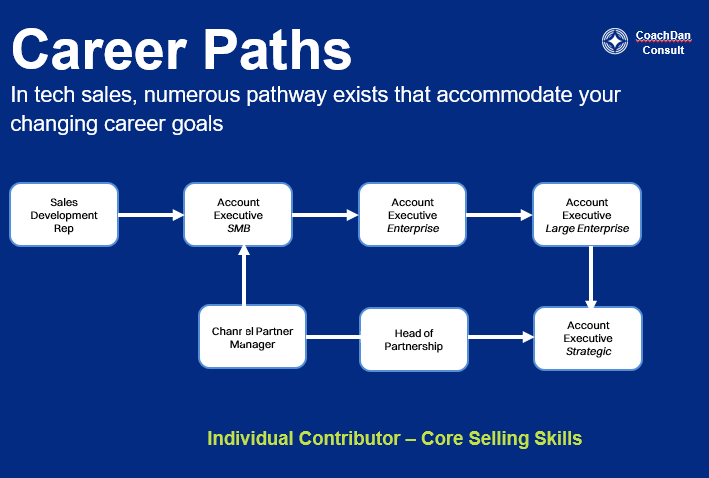Tech Sales: The Hidden Gem of the Tech Industry
Curious about tech sales? This post breaks down what it is, why it's a great entry point into tech, and the pros and cons to help you decide if it's right for you.
Daniel A.
5/8/20245 min read


Introduction
Many professionals dream of working in tech. They’re drawn to the culture, the innovation, and the lifestyle that friends, family, or former classmates seem to enjoy. As a result, people often explore popular paths like software engineering, data analytics, product management, or cybersecurity. They've invested heavily—paying for online courses, binge-watching YouTube tutorials, and applying relentlessly. Some make progress, land internships, or even secure full-time roles, only to find the work unfulfilling or misaligned with their strengths.
Here’s the good news: most people overlook a valuable opportunity in tech—tech sales. Some simply don’t know it exists, while others have heard of it but misunderstand what it actually involves. This article introduces tech sales and explains why it could be the ideal way for you to break into tech—especially if you enjoy communication, strategy, and working with people.
What is Tech Sales?
At its core, tech sales is just like any other form of sales—it’s about helping customers solve problems using the company’s product or service. The difference? In tech, selling is often virtual, with occasional in-person meetings depending on the role or client. Unlike the physically demanding and largely unstructured nature of traditional door-to-door sales, tech sales is highly strategic. You’re equipped with powerful tools to help you identify prospects, engage them meaningfully, and move them through a well-defined sales process. Most tech companies also provide clear systems, robust training, and collaborative team environments to support your success.
The tech sector is a high-growth industry, and sales teams are often the engine driving that momentum. As a result, they make up a significant portion of a company’s workforce—especially in startups where growth and customer acquisition are critical priorities.
Rationale for Tech Sales
When a startup launches, the focus is typically on building a product to solve a specific problem. Founders hire engineers to develop a solution, and once it gains traction, the next big challenge is growth. Without it, the business can't scale, gain market share, secure funding, or further iterate the product.
That’s where sales come in. Sellers are responsible for getting the product into the hands of the targeted users. More users mean more revenue—and ultimately a more valuable company. In other words, you can’t scale a great product without great sales. That’s why tech sales is not just relevant—it’s essential.
Why Join Tech Sales?
1. Low Barrier to Entry
Unlike fields like software engineering or data science, tech sales doesn’t come with a long list of prerequisites. The most essential skill is communication—something many professionals already possess from roles in education, customer service, healthcare, or consulting. In fact, some companies don’t even require a college degree.
2. Diverse Skillsets Welcome
Tech sales is incredibly flexible. Professionals from a wide range of backgrounds can thrive. For example, a former teacher could easily transition into selling EdTech solutions. Someone with a background in finance could bring credibility while selling to banking clients. Your previous experience is not a liability—it’s often a huge advantage.
3. High Earning Potential
Tech sales roles tend to offer above-average compensation, even at entry-level positions. Pay is usually split into base salary and variable (commission) pay. Many roles offer uncapped commissions, meaning there’s no limit to what you can earn. Top performers can earn $200K–$500K annually as they grow into roles like Account Executive or Sales Manager.
4. Fast Career Progression
Sales is one of the few fields where your results speak louder than your résumé. Clear Key Performance Indicators (KPIs) mean that promotions are merit-based, not politics-based. It’s not uncommon to be promoted within 12–18 months. Strong performers can quickly move into leadership, strategy, or customer success roles.
5. In-Demand Roles
According to industry forecasts, the global tech sales industry is expected to reach $105 billion by 2030. As more startups receive funding, their first major hire after engineers is usually sales professionals. That’s why experienced sellers are constantly in demand—and why job mobility in this field is often higher than you’d expect.
6. Transferable Skills
Perhaps the most underrated benefit of tech sales is the versatility of the skills you develop—negotiation, relationship-building, problem-solving, and resilience. These skills open doors in nearly every industry and career path, from entrepreneurship to consulting to marketing.
Why You Shouldn't Join Tech Sales?
1. It Requires Self-Motivation
Tech sales is not for the unmotivated. You’ll need to set your own pace, manage your pipeline, and bounce back from setbacks. If you’re not naturally driven, it may be a tough adjustment.
2. You’ll Face Rejection (A Lot)
Even seasoned sellers hear "no" more often than "yes." That’s just part of the job. It takes mental toughness and a positive mindset to stay focused and keep moving forward.
3. Performance Driven
Every sales rep is measured by targets—monthly, quarterly, or annually. Failing to hit your numbers could affect bonuses, career growth, and even job security. If you thrive under pressure, you’ll love it. If not, the stress can be overwhelming.
4. Continuous Learning
Sales tools evolve, products change, and market segments shift. To stay competitive, you’ll need to continuously learn—whether it’s mastering a new sales software, understanding a new customer segment, or getting familiar with an updated product feature.
5. Fluctuating Income
While base salaries in tech sales are often competitive, a significant portion of your compensation is performance-based. For instance, a role might offer an $80K base and a $60K variable—meaning your monthly income can vary. If financial stability is a priority, this model may feel unpredictable. Strong financial discipline is also essential to manage both high-earning periods and leaner months.
Pathways in Tech Ways
The most common entry point into tech sales is as a Business Development Representative (BDR) or Sales Development Representative (SDR). In these roles, your job is to generate interest and book meetings for more senior sales reps. From there, you can grow into roles like Account Executive (AE), where you close deals, or move into customer success, partnerships, or sales strategy.
Whether you're looking for a long-term career in sales or simply a stepping stone into tech, the pathways are clear and well-supported in most organizations.
Next Steps
Curious about whether tech sales is right for you? Start by learning the basics—our free Introduction to Tech Sales course is a great place to begin. If you’re ready to dive deeper and want a guided path, Contact Us to enroll in our immersive tech sales training program.
Your tech career might not look like what you imagined—but it might turn out even better. Don’t miss out on the opportunities that tech sales can offer.




